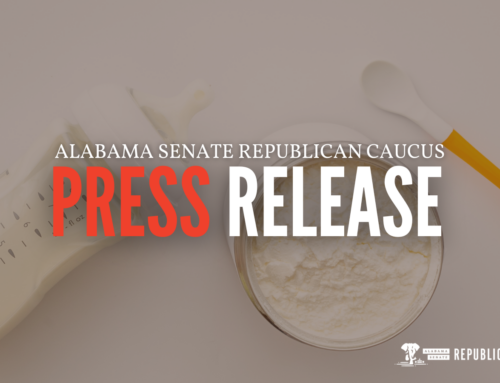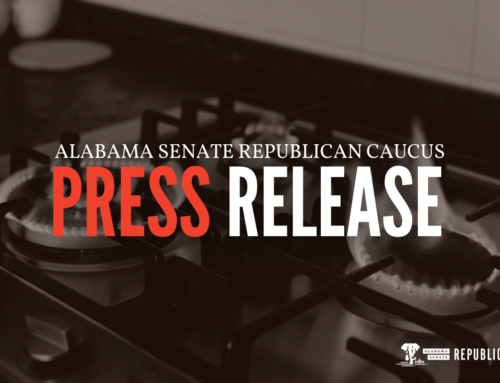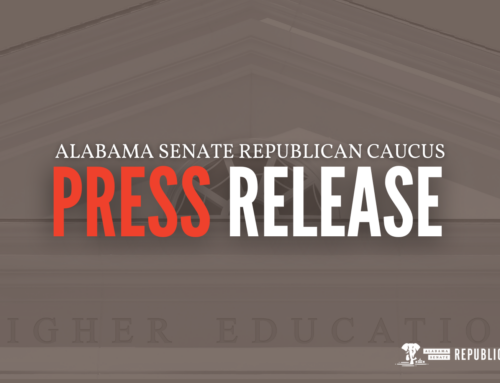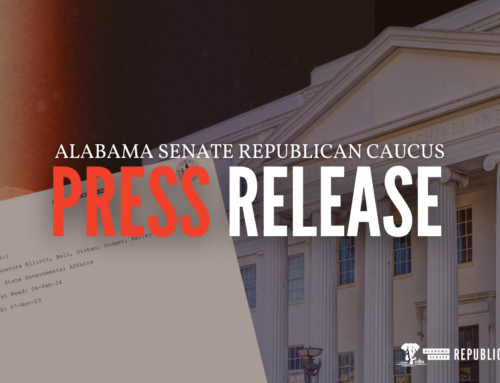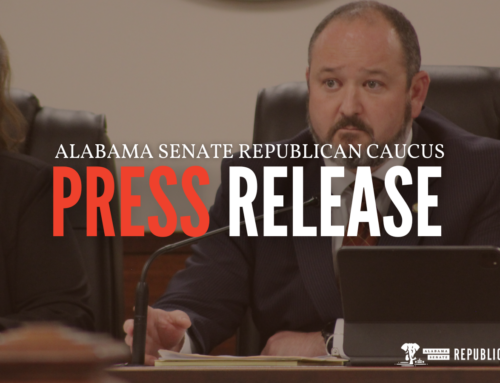MONTGOMERY, Ala. – The Alabama State Senate today concluded the 2022 legislative session. Senate leaders President Pro Tem Greg Reed (R-Jasper) and Majority Leader Clay Scofield (R-Guntersville) worked diligently throughout the session to ensure the process ran effectively and efficiently, yielding positive results for the people of Alabama.
Pro Tem Reed commended his colleagues in the Senate for their collaborative work and successful efforts.
“My colleagues have worked tirelessly throughout this session to defend Alabama’s values, put more money back in hardworking Alabamians’ pockets, and build a stronger future for our children. We started out with legislation investing $772 million to make a multi-generational impact for Alabama, expanding high-speed broadband internet access, supporting our health care system and volunteer fire departments, strengthening hometowns across our great state, and increasing 21st century opportunities for all Alabamians,” said Reed. “The legislature only picked up steam from there, and I am proud to say that along the way, we took historic steps to protect our inalienable Second Amendment rights, secure our elections, establish Alabama as the most military-friendly state in the nation, support our small businesses, retirees, and farmers, and improve our state’s education system. We also passed two record budgets that included pay raises for teachers, increased funding for mental health services, one-time bonuses for state retirees, and much more. Thanks to fiscal conservatism by the legislature in recent years, we were able to do this while delivering $160 million in annual tax cuts for Alabama families and small businesses. It was an honor to work alongside my colleagues this session; members of the Senate worked diligently on the priorities important to their respective constituents. Moving forward, we will continue our work to make Alabama the best possible place to live, work, worship, and raise a family.”
Majority Leader Scofield applauded his Caucus’ efforts to prioritize an agenda that successfully meets the needs and addresses the concerns of an overwhelming majority of Alabamians.
“Senate Republicans developed and executed a purposeful agenda this session, passing several pieces of legislation to address the concerns made clear by people across the state. Prior to the session, we identified key priorities voiced by the majority of folks back home. On the final day of session, I can confidently say that we overwhelmingly addressed those needs,” said Scofield. “From providing $160 million in relief for Alabama taxpayers and small businesses to increased security of the state’s elections, further protections of our God-given constitutional rights, and everything in between, Senate Republicans have made it crystal clear that we stand with everyday Alabamians. The items we chose to pursue will improve the quality of life for all, and I am proud of our Caucus members for putting the interests of their constituents above all else to deliver solid conservative policy that will transform our state for decades to come.”
Below are several key pieces of legislation prioritized by the Senate Republican Caucus and passed by the legislature:
- American Rescue Plan Act (ARPA) Funding: The legislature made a $772 million investment in communities across the state that will impact Alabamians for generations to come. This piece of legislation appropriates funds made possible through ARPA, which was passed by Congress in 2021 to assist with the challenges brought upon by the Covid-19 pandemic, for health care, broadband, infrastructure, the unemployment insurance trust fund, telemedicine, rural hospitals, county reimbursements, and volunteer fire departments/EMS.
- Broadband Expansion Legislation: Leaders in Alabama continue to work together to address the lack of high-speed internet access across the state. The legislature passed three bills to modify Alabama’s broadband expansion process including a proposed constitutional amendment that, if approved by Alabama voters, would allow a state, county, or municipality to grant federal award funds or any other source of funding designated for broadband infrastructure to any public or private entity for the purpose of providing or expanding broadband infrastructure.
- Tax Cuts and Exemptions: The Senate passed a tax cut package totaling $160 million in annual relief to keep money in the pockets of taxpayers and small businesses. Among these bills is an exemption from an additional $87.7 million state income tax for working Alabama families on certain expanded tax credits included in federal Covid-19 relief. Another piece of legislation allows $6,000 of taxable retirement income to be exempt from state income tax for individuals who are 65 years of age or older and provides tax cuts for low-income Alabamians and retirees.
- Small Business Assistance: Small businesses took a major hit over the last two years, and the pandemic substantially hindered growth and job creation for these enterprises. Lawmakers have made a great effort throughout that time to provide these businesses with the much-needed relief they deserve. The Small Business Relief and Revitalization Act provides several significant relief provisions for Alabama taxpayers, small businesses, and farmers. Additionally, the legislature passed a bill to eliminate the $100 minimum state business privilege tax levied on certain corporations, business trusts, limited liability entities, and disregarded entities, resulting in a $23 million tax cut for over 230,000 small businesses. Lieutenant Governor Will Ainsworth and the Alabama Small Business Commission helped lead these efforts.
- Historic State Budgets: Both the General Fund and Education Trust Fund budgets are the largest in the state’s history. Totaling $2.70 billion, the General Fund budget repays borrowed funds to the Alabama Trust Fund, increases funding for mental health including two additional crisis diversion centers, provides for a cost-of-living adjustment for state employees, and sends money back to Alabama taxpayers. The Education Trust Fund, totaling $8.26 billion, provides substantial funding to address the demand to recruit and retain educators in Alabama by providing record pay increases and opportunities to address several critical needs across the state to better Alabama’s education standing.
- Military Package: A key mission of the Senate during recent years has been to provide ample support for Alabama’s extended defense, aerospace, and intelligence communities. Governor Ivey signed a legislative military package passed by the legislature to ensure Alabama remains the nation’s most attractive and friendliest state for active-duty military, their families, and veterans. These bills ease the process of relocation for military families, make it easier to find work upon relocating, aid them in the most unfortunate of times, and create the Space National Guard within the Alabama National Guard.
- Second Amendment Protections: The legislature passed legislation to defend the Second Amendment rights of Alabamians, including Constitutional Carry and the Second Amendment Protection Act. Constitutional Carry allows law-abiding Alabamians to carry a handgun for personal protection without paying a tax or obtaining a license from the state, preserving their fundamental Second Amendment right to protect themselves, their loved ones, and their homes. The Second Amendment Protection Act shields Alabamians from any unnecessary federal overreach by placing a ban on the use of certain public funds, state agencies, and political subdivisions to enforce any federal act, law, order, rule, or regulation relating to firearms, firearm accessories, or ammunition.
- Support for Farmers: Agriculture is one of Alabama’s top producing industries, accounting for more than 20 percent of jobs in the state. The legislature passed the Farm Package to enhance Alabama’s agriculture industry and support farmers and producers across the state. These bills protect and empower family farms, stimulate local economies, eliminate inconsistencies in existing law, and designate the peanut as the state’s official legume.
- Restoring Fairness in Elections: The Senate and House passed legislation to safeguard the security and integrity of Alabama’s elections, including bills to prohibit private companies from funding election-related activities and prohibit public officials and employees from expending public funds on activities advocating in favor of or against a statewide or local ballot measure and from the improper use of public property for political activities. Countless Alabamians have voiced their concerns for the safety and fairness of our elections, and the legislature continues to propose meaningful solutions to prevent various forms of election fraud from occurring in the state.
- Improvements for Education: The Alabama Numeracy Act provides for further improved mathematics instruction in public schools and a means for increasing grade level proficiency in mathematics for students in grades K-5 by establishing summer learning programs, assessment tests, accountability standards for teachers and principals, and additional training and standards for teacher education programs.
The legislature concluded the twenty-ninth and final day of the 2022 legislative session on Thursday, April 7. A special session to allocate a second round of ARPA funds will take place later this year.



